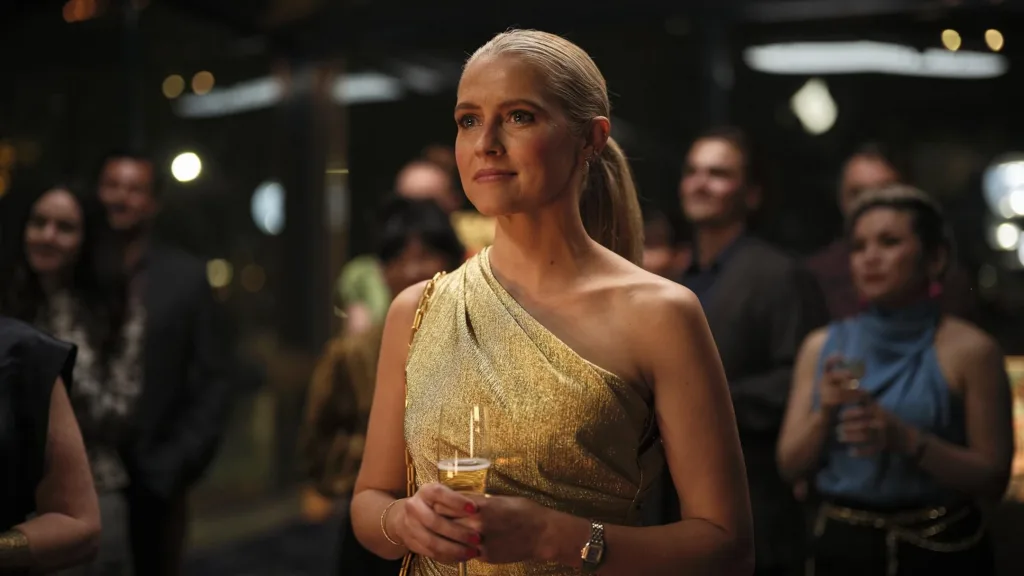The romantic drama built on dual timelines is a familiar narrative structure. It often serves to build suspense around a central mystery—what event drove the characters apart? Mix Tape, an Irish-Australian production, employs this device but shifts its focus. The story introduces us to Alison and Daniel, first as teenagers in 1989 Sheffield, where a raw, immediate connection forms over shared cassettes of The Cure and New Order.
Their courtship is built song by song. The narrative then cuts to the present, finding them as adults living entirely separate lives on opposite sides of the globe, each married with children. The series is less interested in the mechanics of a potential reunion and more in examining the persistence of memory.
It poses a different question: not will they get back together, but can a person ever find closure for a formative relationship that never had a clean ending? The story is built around the quiet, lingering pull of that first, definitive attachment.
The Echo of a Performance
A dual-timeline narrative lives or dies on the believability of its characters across the decades, a challenge that here requires four actors to create two people. As the adult Alison, now a successful author, Teresa Palmer projects a quiet thoughtfulness; her guarded expressions suggest a life built on top of an unresolved past.
Opposite her, Jim Sturgess gives the adult Daniel, a music journalist, a sense of being perpetually adrift, a man haunted by the empty spaces in his own history. Their performances are defined by a shared, unspoken yearning. This dynamic is only effective because of the work done by their younger counterparts. Florence Hunt’s teenage Alison is magnetic but watchful, shaped by a difficult home life she conceals.
Rory Walton-Smith captures the dizzying, absolute certainty of a first crush. The chemistry between them is immediate and genuine, providing the emotional foundation for the entire series. The four performances function as a single arc; the younger pair lights the fire, and the older pair tends to the embers that still glow twenty-five years later.
The Diegetic Heartbeat
In this show, the soundtrack is not merely ornamentation; it is the primary engine of the narrative. The title is a literal description of the story’s main communicative act. Alison and Daniel build their relationship by curating songs for one another, turning cassettes into a language for feelings they cannot otherwise articulate.
The music of late-80s Sheffield—Joy Division, The Smiths—is not just for atmosphere but is a vocabulary shared between two shy teenagers. The show’s creators demonstrate a clear understanding of this principle from the opening scene. When Daniel first spots Alison, New Order’s “Bizarre Love Triangle” is playing, its lyrics about confused longing and emotional paralysis setting the template for their entire relationship, both then and now.
Each needle drop functions as a timestamp, a piece of dialogue, or an emotional signifier. The music is the story’s narrator, speaking volumes when the characters themselves are at a loss for words.
A Well-Constructed Echo Chamber
The series sidesteps the common pitfalls of its structure through thoughtful execution. The editing, in particular, avoids jarring jumps between time periods. Instead, the transitions feel fluid, connecting a memory to a present-day action with an instinctual logic.
This technique makes the two timelines feel like dependent parts of a single, continuous emotional experience. The narrative manages to explore its poignant themes with a gentle touch, finding sweetness in the character moments without succumbing to cheap sentimentality. Its four-episode run feels intentional, giving the story enough space to breathe without overstaying its welcome or diluting its focus.
The result is a contained, effective piece of television that leaves one thinking about the characters and their choices. It presents a story where the past is not a foreign country but a room that some people never quite leave.
Mix Tape is a four-part romantic drama based on the novel by Jane Sanderson, adapted for TV by Jo Spain and directed by Lucy Gaffy. It premiered on June 12, 2025, on BINGE (Australia) and Showcase, following earlier awards at SXSW Film & Television Festival, where it won the TV Spotlight Audience Award. Production was shot across Sydney, Dublin, and County Wicklow in mid‑2024. Available now on BINGE in Australia; the BBC is also set to air it on iPlayer and BBC Two during summer 2025
Full Credits
Director: Lucy Gaffy
Writers: Jo Spain
Producers: Angie Fielder, Polly Staniford, Aoife O’Sullivan, Tristan Orpen Lynch
Cast: Teresa Palmer, Jim Sturgess, Florence Hunt, Rory Walton‑Smith, Julia Savage, Ben Lawson, Jacqueline McKenzie, Chika Ikogwe, Mark O’Halloran, Helen Behan, Conor Sánchez, Jonathan Harden, Siobhan O’Kelly, Alexis Rodney, Sara Soulié
Editors: Katrina Barker, Christine Cheung
The Review
Mix Tape
Mix Tape uses a familiar dual-timeline structure but executes it with rare emotional intelligence. Its success lies in the fluid connection between past and present, anchored by four perfectly cast performances. While the story treads well-worn romantic paths, its thoughtful construction and use of music as a core narrative device make it a poignant, affecting examination of first love and lasting memory. A quiet but well-crafted piece of television.
PROS
- Four strong and complementary lead performances.
- Music is skillfully integrated as a central narrative tool.
- Fluid editing creates a seamless and effective dual-timeline story.
- A well-paced and contained four-episode arc.
CONS
- The central premise is familiar territory for the genre.
- Its quiet, reflective pace may be too slow for some viewers.
- Certain emotional beats can feel predictable.
















































